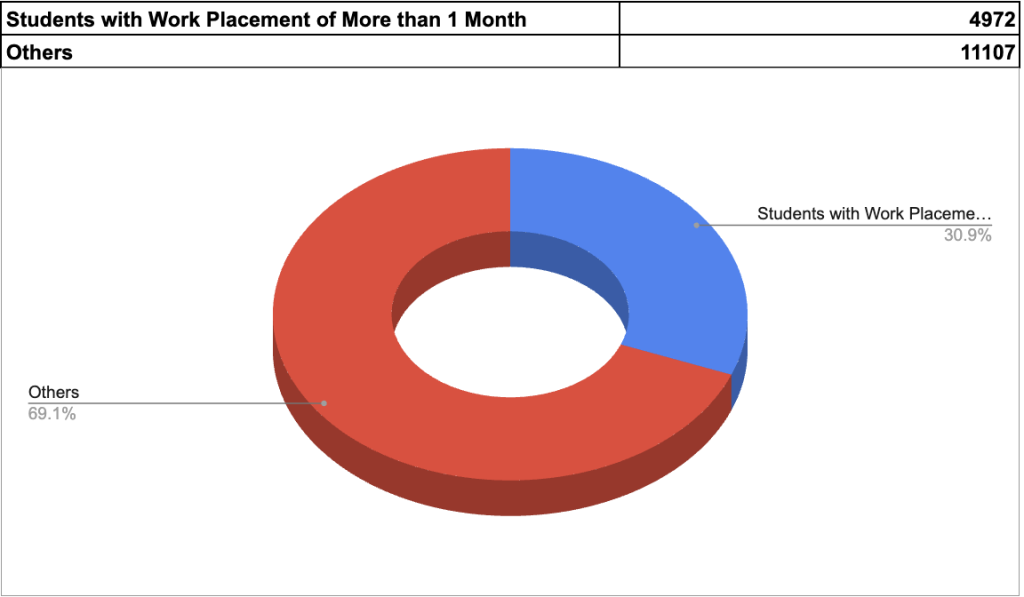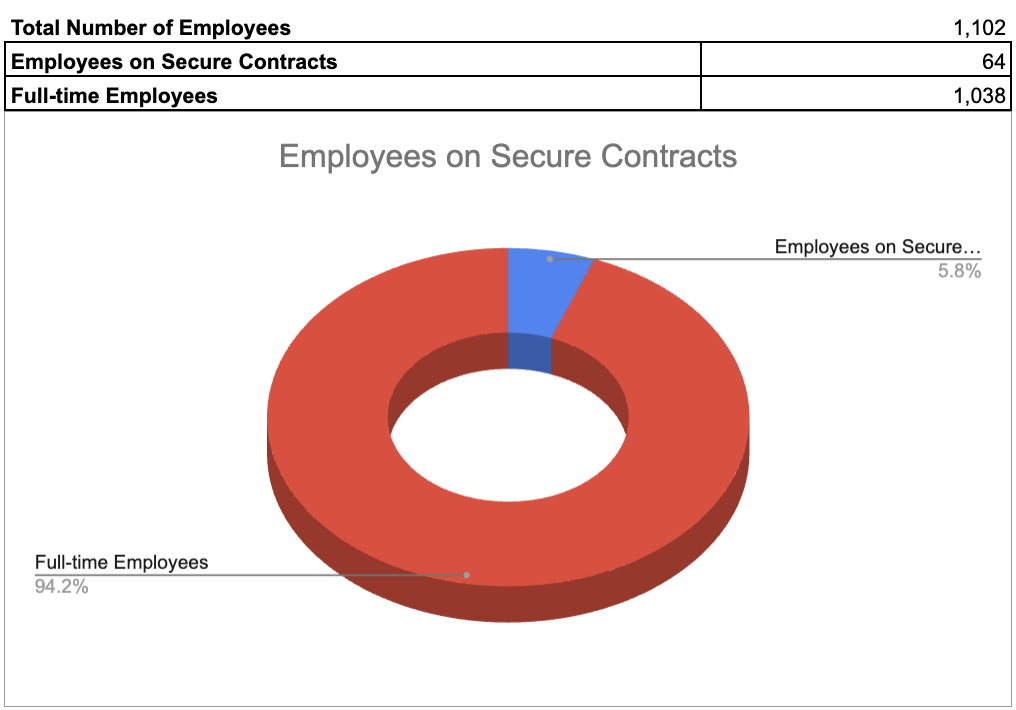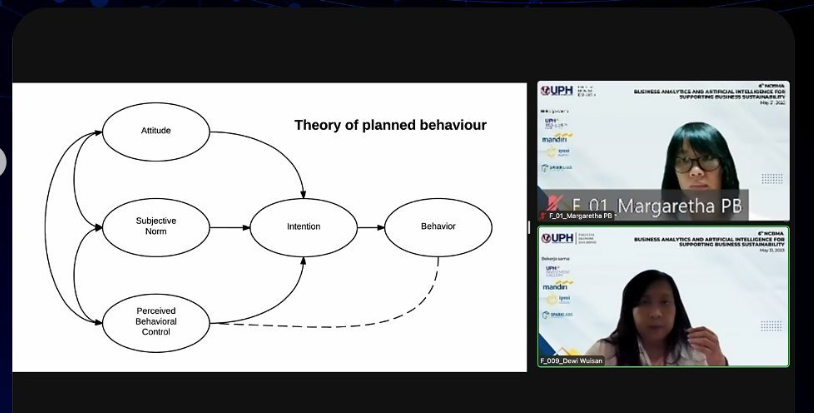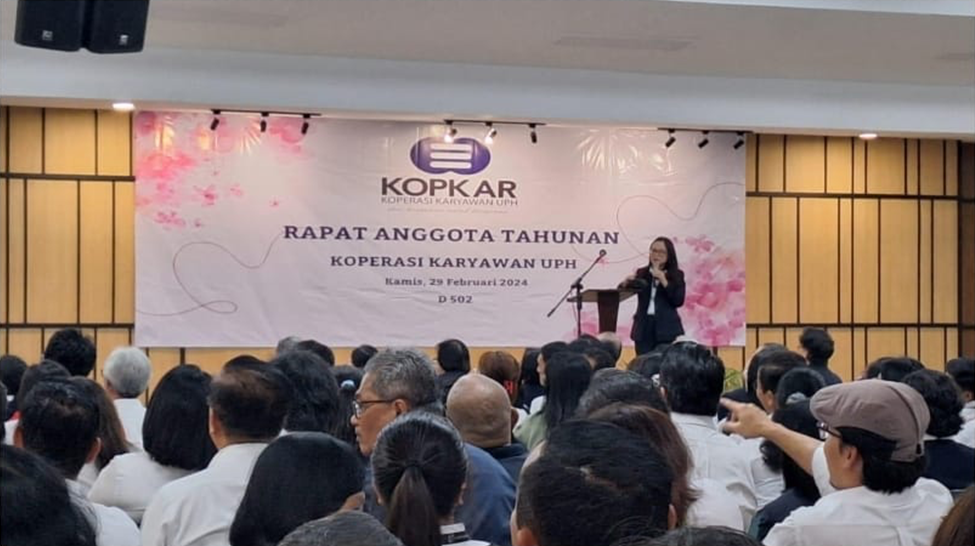
SDG 8: DECENT WORK AND ECONOMIC GROWTH
Universitas Pelita Harapan (UPH) is committed to SDG 8: Decent Work and Economic Growth by promoting sustainable economic practices and preparing students for successful careers. The university offers programs that emphasize entrepreneurial skills, innovation, and economic development. UPH collaborates with industry partners to provide internships, job placements, and real-world experiences, enhancing employability and supporting career growth. The university also fosters a culture of research and development that drives economic progress and supports sustainable business practices. Through these efforts, UPH aims to contribute to inclusive and sustainable economic growth and create opportunities for meaningful employment.
Expenditure per Employee
Employment Practice
Proportion of Students with Work Placements
Proportion of Employees on Secure Contracts
0 IDR
University Expenditure
0
Number of Employees
0
Number of Academic Staff
Employment Practice Living Wage
Universitas Pelita Harapan (UPH) ensures that all staff and lecturers receive proper compensation in accordance with the Tangerang City Minimum Wage (UMK) of Rp 4.584.519 per month for employees with qualifications below a Bachelor’s degree. For lecturers and staff holding Bachelor’s degrees or higher, salaries are determined based on their position, role, and job description. In the case of lecturers, salary determination also considers educational background, academic rank, and any additional structural assignment allowances. The Human Resources Department (HRD) oversees the implementation of fair and timely remuneration, with salary disbursements made on the 25th of each month directly to employees’ registered bank accounts. These provisions are outlined in Article 25 point 4 of 2023–2025 UPH Foundation Company Regulations, which state that even the lowest salary is not below the Tangerang minimum wage and are in compliance with government regulations.
Employment Practice Unions
The Koperasi Karyawan (KOPKAR) at Universitas Pelita Harapan functions as an employee cooperative designed to represent, support, and empower staff members. As of May 2024, it includes 709 members (56% of total employees). Through regular meetings and democratic decision-making, members actively shape the cooperative’s policies and ventures—such as the on-campus meal shop, which provides shared economic benefits.
KOPKAR exemplifies fair and participatory employment practices by fostering collective representation and dialogue between employees and management. It aligns with the principles of Employment Practice Unions through:
- Collective Representation and Worker Voice – The cooperative serves as a formal channel for employees to express concerns, negotiate, and participate in institutional decision-making.
- Democratic Governance – Regular member meetings and voting rights ensure that policies are worker-driven and transparent.
- Economic Empowerment – Initiatives like the employee-run meal shop promote shared prosperity, reinforcing financial inclusion and workplace solidarity.
- Improved Working Conditions – By advocating for employee welfare and fair treatment, KOPKAR supports a more equitable and supportive work environment.
Through its cooperative structure, KOPKAR strengthens the social dialogue, participatory governance, and economic empowerment that underpin ethical employment practices. It showcases how union-like mechanisms within an academic institution can enhance worker welfare, engagement, and sustainability.
Read More Here: UPH Employee Cooperative Serves as Collective Voice for Staff
Employment Policy on Discrimination
Employment policy in Universitas Pelita Harapan (UPH) is regulated under the 2023-2025 UPH Foundation Company Regulations, specifically in Article 6 point 3, which is stipulates that the recruitment of employees is solely based on their educational background and working experience. The recruitment process upholds the principle of non-discrimination, ensuring that all applicants are evaluated fairly regardless of gender, ethnicity, or other personal backgrounds. Selection is carried out objectively based on the candidate’s qualifications, competence, and compliance with the established requirements. Prospective employees must demonstrate good conduct with no criminal record, possess valid identification, meet the required educational or experiential standards, pass the official selection process, and be declared medically fit by an authorized physician. Furthermore, they must be willing to sign either a Fixed-Term or Permanent Employment Agreement in accordance with institutional policies and comply with all regulations set by the UPH Foundation or University.
Additionally, Circular Letter Regarding Inclusive and Anti-Discriminant Campus Environment in Universitas Pelita Harapan No. 005A/R-UPH/I/2023, further emphasize UPH’s role and commitment towards non-discrimination towards employment. As states in point a), that non-discrimination also applies to the admission of all academic members in UPH, not only for students, but also including its academic and non-academic support staff.
Employment Policy Modern Slavery
Through the implementation of the Memo Regarding Prevention of Modern Slavery within Universitas Pelita Harapan (No. 239A/R-UPH/VII/2022), UPH firmly reinforces its stance against all forms of modern slavery and exploitative labor practices. This policy ensures that every member of the university community—academic or non-academic—operates within an ethical, transparent, and lawful employment framework. UPH mandates proper verification of worker identity and age, the use of formal employment contracts, and the assurance that all employees are physically and mentally capable of performing their roles responsibly. By enforcing these measures, UPH upholds human dignity, prevents forced or underage labor, and guarantees fair working conditions in line with national regulations and international human rights standards. This reflects UPH’s continued commitment to ethical governance and aligns with SDG 8 – Decent Work and Economic Growth and SDG 16 – Peace, Justice, and Strong Institutions.
Employment Practice Equivalent Rights Outsourcing

The right to equality in the workplace, as mandated by the Undang-Undang Dasar 1945 (Indonesian Constitution), Article 28 Paragraph 2, guarantees that every individual has the right to be free from any form of discrimination. In addition, the Undang-Undang Cipta Kerja Tahun 2020 (Job Creation Law of 2020) provides legal protection for outsourced workers in Indonesia.
As an institution that employs outsourced personnel, Universitas Pelita Harapan (UPH) consistently fulfills its legal and ethical responsibilities in accordance with national labor laws. The university ensures that outsourced employees receive:
- Fair and decent wages that meet government minimum standards;
- Welfare protection, including health insurance as required by law;
- Access to university facilities and amenities;
- A safe and healthy work environment equipped with proper safety tools;
- Respect for their rights to association, privacy, and equitable treatment; and
- Clear, non-discriminatory employment contracts specifying job details, duration, and working conditions.
UPH also integrates outsourced workers into its inclusive campus community. They have access to shared facilities, including a Muslim prayer area on the 2nd floor of Building B, and are encouraged to practice their faith freely. Christian outsourced employees are provided opportunities for spiritual growth through participation in religious services and retreats, while non-Christian employees are given equivalent space and time for worship in designated areas across the campus.
All outsourcing arrangements and payments are formalized under a Memorandum of Understanding (MoU) or Perjanjian Kerjasama between UPH and its partner outsourcing companies. This cooperative framework fosters ethical partnerships and supports SDG 8 – Decent Work and Economic Growth, by promoting fair labor practices, lawful employment, and collaborative workforce development.
As part of its appreciation and welfare initiatives, UPH organizes an annual event called “Aksi Natal UPH.” This celebration honors outsourced employees through engaging performances, door prizes, free medical checkups, and additional financial assistance for their children and household needs. The event reflects UPH’s continued commitment to inclusivity, compassion, and the holistic well-being of all members of its community.

Employment Policy Pay Scale Equity
The principle of pay scale equity at Universitas Pelita Harapan (UPH) is clearly established under the 2023–2025 UPH Foundation Company Regulations. Article 25 affirms that all employees are entitled to equal compensation based on merit, without discrimination on the grounds of gender, race, or any other personal background. Employee salaries are determined transparently through formal employment contracts, mutually signed by the prospective employee and the Director of Human Resources. Beyond the principle of “equal pay for equal work,” UPH further demonstrates its commitment to employee welfare by providing a comprehensive range of benefits, including Leave with Pay (Articles 20 and 24), Assistance for Further Studies (Article 27), Overtime Pay (Article 28), Pay During Illness (Article 29), and Maternity and Paternity Leave (Articles 22 and 23).
In addition, the Circular Letter Regarding Inclusive and Anti-Discriminatory Campus Environment (No. 005A/R-UPH/I/2023) reinforces UPH’s institutional dedication to fairness and inclusivity across all aspects of university governance and employment practices. Collectively, these policies exemplify UPH’s position as a model of equitable and non-discriminatory employment, embracing all members of its academic and non-academic community (civitas academica) with dignity and respect.
Tracking Pay Scale for Gender Equity
Universitas Pelita Harapan (UPH) upholds a strong commitment to gender equality in compensation by ensuring that salary structures and remuneration policies are free from gender-based disparities. All compensation decisions are based solely on objective criteria such as educational qualifications, professional experience, and individual performance, rather than gender or other personal characteristics.
This commitment is formally codified in the 2023-2025 UPH Foundation Company Regulations , which emphasize transparent and equitable pay practices for all employees. The implementation of this principle is further reinforced through several institutional decrees, including:
- Rector’s Decree No. 084/SKR-UPH/VI/2022 on incentives for publication of scientific works, artistic creations, and intellectual property rights;
- Rector’s Decree No. 098/SKR-UPH/VII/2022 on incentives for lecturers or subject-matter experts developing online courses; and
- Rector’s Decree No. 167/SKR-HRD-UPH-LV/XII/2022 on official travel allowances for employees.
UPH also supports equal professional development opportunities for all employees through education and training programs. This includes funding for further studies at undergraduate, master’s, and doctoral levels, as stipulated in Rector Decree No. 031/SKR-HRD-UPH-LVI/III/2019 concerning provisions for advanced study and specialization for academic and administrative staff.
Through these structured policies and transparent remuneration systems, UPH ensures consistent monitoring and enforcement of pay equity across genders, reinforcing its broader commitment to fairness, inclusion, and compliance with SDG 5 – Gender Equality and SDG 8 – Decent Work and Economic Growth.
Employment Practice Appeal Process
Universitas Pelita Harapan has instituted a formal, multi-tiered system to address and resolve employee grievances, including concerns related to labour rights and wages. The process ensures a transparent and open procedure for all staff members and is detailed within the university’s official regulations.
The Universitas Pelita Harapan Company Regulations guarantees its employees a fair and open complaints process as stated in Article 39, No. 1: “Yayasan/Universitas menganut sistem komunikasi dua arah yang bebas, terbuka dan bertanggung jawab”. Furthermore, workplace disputes are handled based on their severity. Minor issues are initially managed and moderated through internal processes within the specific department involved, promoting rapid and direct resolution (“Keluhan yang bersifat minor dan biasanya bersifat lisan, dapat disampaikan langsung kepada atasan masing-masing atau kepada Pimpinan Bagian dan/atau Direktorat/Fakultasnya”—Peraturan Perusahaan Yayasan Universitas Pelita Harapan Tahun 2023-2025, Article 39, No. 4a)
For more significant matters, a formal complaint can be lodged, which is then channeled to the Human Resources Development Director and the Legal Aspect Department. These bodies work in collaboration, following a controlled process to thoroughly investigate the complaint and arrive at a resolution.
Should a dispute remain unresolved after exhausting all internal avenues, the procedure dictates that the case will be escalated to the local Labour Agency (“Apabila permasalahannya tidak dapat terselesaikan, maka dimintakan bantuan penyelesaiannya kepada Dinas Tenaga Kerja setempat.”— Peraturan Perusahaan Yayasan Universitas Pelita Harapan Tahun 2023-2025, Article 39, No. 5). The involvement of an external, official body provides a final level of appeal, underscoring the university’s commitment to fair and equitable employment practices.
Employment Practice Labour Rights

Universitas Pelita Harapan upholds employee labor rights through established internal governance and negotiation frameworks. The university ensures representation for all academic and non-academic staff through its University Senate, with members selected from each department and faculty. This structure operates on a non-discriminatory basis, without regard to gender, age, or national origin.
The formation of the Senate aligns with Indonesia’s national laws, specifically Article 28 of the 1945 Constitution, which guarantees the freedom of association and assembly for all citizens. In the absence of a formal trade union, this body serves as the primary channel for employee representation.
For collective bargaining and dispute resolution, the university’s Human Resources Department engages in bipartite deliberations with employee representatives. All negotiations are conducted in good faith, aiming for mutual consensus and compromise as outlined in the university’s official regulations for employees (years 2023-2025). Furthermore, Universitas Pelita Harapan recognizes the right of all employees, including women and international staff, to join scientific development associations without discrimination, fostering an environment of professional growth.








